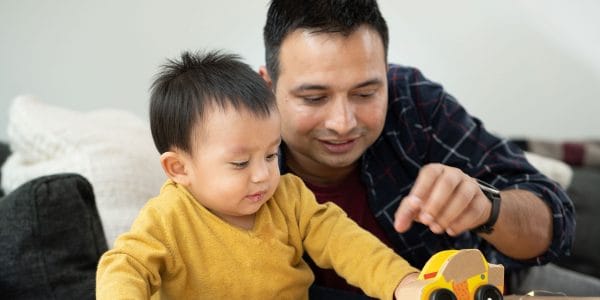Most UK dads want more home-based and flexible working following the pandemic. They want to maintain increases in their childcare time, which they believe has made them better fathers. This is according to a new Nuffield-funded BritainThinks survey for the Fatherhood Institute.
Lockdown Fathers: the untold story, a new study based on a nationally representative survey-sample of more than 2,000 fathers, found that most spent more time with their children, built stronger relationships with them, and improved their parenting skills during the first COVID-19 lockdown. They grew in confidence as parents, gained greater insights into their partners’ caring roles, and did more housework.
Four out of five (78%) of fathers in two-parent households spent more time with their children; 68% spent more time on homeschooling/ helping with homework; and 59% spent more time on cleaning, laundry and cooking. The figures were even higher among those partnered fathers who were at home full-time during lockdown. These findings are consistent with several time-use studies, including a Nuffield-funded report from the Institute for Fiscal Studies which found that, during the Spring 2020 lockdown, fathers almost doubled the number of hours in which they did some childcare from just over four to eight hours per day. Meanwhile, mothers’ equivalent input increased from almost seven to 10.3 hours.
More than two-thirds (65%) of partnered fathers reported a better father-child relationship following lockdown (rising to 73% among those who were full-time at home). Almost half (48%) left lockdown feeling more competent as a parent, and 42% were better able to keep calm and manage their tempers with their children. A small but significant minority (14%) felt less able to manage their tempers with their children.
Over three-fifths (61%) of partnered fathers reported understanding their children better and feeling closer to them (64%) after lockdown. Almost all the rest (likely including some who had felt very close beforehand) reported no change. Only 2-3% reported closeness and understanding deteriorating.
More than half the partnered fathers (57%) said that, following lockdown, they feel better equipped to support their children’s learning and education. The same was even said by 50% of the most disadvantaged – who were more likely to be working outside home during lockdown. Those fathers who had spent more time with their children during the lockdown were more likely to report improvements in their own mental well-being.
Black, Asian & Mixed Heritage fathers in two-parent households were more likely (29%) than White fathers (19%) to report a positive impact of lockdown on their mental well-being, to report increased closeness with their children (79% compared to 61%) and to report improvement in their couple relationship from before to after lockdown.
The experiences of separated fathers were more mixed and depended largely on how much they were able to see of their children: during the Spring 2020 lockdown, 40% saw more of their children than before lockdown, and 46% less separated fathers who saw less of their children were more likely to report worse mental wellbeing. Half of the separated fathers reported a co-operative relationship with their child’s other parent, and one-in-four said that relationship ‘makes me happy’.
Key recommendations
Work
- Employers’ HR policies should support fathers’ desire to work more flexibly and/or work from home. They should take account of men’s caregiving commitments (including sharing care of children with former partners) and men’s longer average commuting times, when developing and communicating about work plans and shift schedules.
- The forthcoming Employment Bill should create a duty on employers to advertise vacancies flexibly wherever possible and to detail flexibility options.
- Trades unions and professional bodies should help fathers negotiate reasonable, family-friendly work patterns.
Schools
- Schools and early years education providers should work to communicate with and mobilise dads to help with post-pandemic ‘catch-up’ learning, building on what fathers did during the lockdowns.
‘Time with Dad’ campaign launch
Most fathers said that they wanted more flexible (76%) and home-based (63%) working options post-pandemic, in order to continue being better fathers. As a result, the Fatherhood Institute is launching its ‘Time with Dad’ campaign to maintain the ‘lockdown positives’ of fathers spending more time with their children and supporting their learning.
Adrienne Burgess, Co-Chief Executive of the Fatherhood Institute said: “During lockdowns, fathers grew in confidence and competence, providing much more childcare and educational support. Post-pandemic, government, employers and trades unions should help them retain gains in home and flexible working, and schools should enlist dads to help in the huge educational ‘catch-up’ programme. Through our ‘Time with Dad’ campaign, we are building a space to develop new and innovative solutions.”
Ruth Maisey, Education Programme Head at the Nuffield Foundation said: “As lockdown ends, and businesses and offices reopen, employers will be making arrangements for their staff to return to work. We urge employers to consider policies which will improve the work-life balance for their employees, including fathers. We also hope that fathers will grasp this opportunity and negotiate the terms on which they return, for instance submitting flexible working requests, so they retain some of the positive changes brought about by lockdown.”








































